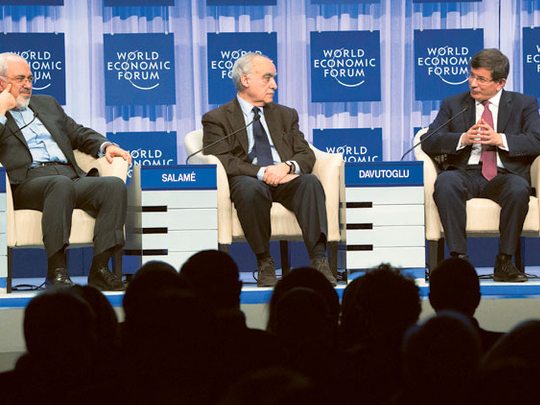
Davos: All of Syria’s neighbours want all foreign forces to leave Syria, if their foreign ministers are to be believed.
But in a lively debate at the World Economic Forum, the foreign ministers of Iran, Turkey and Jordan, and the head of the Kurdish Regional Government in Iraq all said they supported the withdrawal of non-Syrian forces from Syria.
The most scepticism was aimed at Mohammad Zarif, Iranian Foreign Minister, whose government has sent its Islamic Guard to fight on behalf of the government, and has encouraged its ally, the Lebanese Shiite group Hezbollah to fight in Syria.
When Zarif was challenged on his extraordinary assertion by the moderator of the debate, Al Arabiya’s Rima Maktabi, he dodged any direct reply on confirming that Iran had forces in Syria, and shifted the discussion to the foreign Islamist radicals from Europe and Chechnya fighting for Al Qaida and its allies.
He said that it would be relatively easy for all organised forces to leave Syria, but he doubted that the “terrorists and extremists” would do the same.
“We need to end the fighting and start the political process. To do this we need to end the illusion that there is a military solution. All foreign elements should leave Syria. All foreign elements should stop funnelling funds into Syria,” he said in a clear reference to some Gulf states and the Western forces backing the opposition.
A more genuine overview was offered by Gassan Salame of the Paris School of International Affairs who more realistically said that “the two sides do not act as though a political solution can happen, and the Geneva talks are only lip service to the idea of a political solution”.
As Salame listened to the three foreign ministers of Iran, Turkey and Jordan reach apparent agreement on the withdrawal of foreign forces from Syria, he challenged them to take their words to the UN Security Council and implement it. They did not accept his challenge.
But Salame pointed out that even if this happened, foreign fighters in Syria are only about 10 per cent of the forces on the ground. The fighting is so entrenched that the civil war would still continue with the 90 per cent of units that are Syrian.
He was sure that the Syrian tragedy would not be settled soon, and he warned of the fighting spreading to Iraq, where in some weeks recently more people have been killed than in Syria. Iraqi political future is becoming more uncertain every month. He also pointed to the dangers of the approaching impasse in Lebanon’s political structures, as well as to the block in the national dialogue in Yemen.
Ahmet Davotoglu, Turkish Foreign Minister, challenged the pessimism in the room saying that we have to be optimistic.
He said that “to give up and accept that the Middle East is full of blood is simple orientalism, and ignores the region’s pluralistic history and culture.”
He readily acknowledged the present chaos, but argued that it is important to “hold onto optimism and recognise that this is the end of the Cold War working itself out. This is happening in the Middle East two decades after it happened in the Balkans.
“Remember what happened in the shocking ethnic wars in the Balkans, and the huge disaster in Bosnia in 1993. And look at the healthy situation in the Balkan states now.”
Earlier Davotoglu clashed with Zarif over the Iranian’s assertion that Shiite fighters have the right to protect particular Muslim shrines in Syria. Zarif had been speaking of the dangers of allowing Sunni radicals in the Syrian opposition to take root, and he referred to their desecration of the shrines of Sayidna Zainab and Khalid Bin Al Walid, implying that Iranian-backed forces have the right to protect these shrines as they have a particular resonance to the Shiites.
This was bitterly disputed by Davotoglu who said that the shrines were holy to all Muslims, and all Muslims have the duty to protect them. He denied that the Iranians have any special claim to be their protectors, in which he was supported by Nasser Judeh, Jordanian Foreign Minister.
The session closed with a gloomy summary from Richard Hass, Council on Foreign Relations, who said that it is impossible to be optimistic.
“Things will get worse: the war in Syria will continue, Palestine will still be a conflict zone, and the Iran talks will not succeed.”
“Borders count for less and less as forces move freely around the region, and civil wars are becoming proxy wars for outside parties. The realism is that it will get worse,” said Haas.












